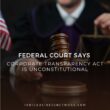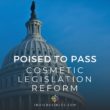The Commonwealth of Massachusetts has scheduled hearings on September 13, 2011, on two cosmetics bills. H1513: An Act Relative To Healthy Cosmetics, introduced by Rep. Kathi-Anne Reinstein (D) will be heard along with H2361: An Act Relative to Safe Cosmetics in the Commonwealth of Massachusetts, introduced by Rep. Bradley H. Jones, Jr. (R) The purpose of this post is to share basic information about the bills. Note that both bills are scheduled for joint hearing before the Massachusetts Joint Committee On Public Health on September 13, 2011. (More about that below.)

HR 1513: An Act Relative To Healthy Cosmetics is shorter of the two bills. Supported by the Personal Care Products Council, the bill essentially requires cosmetics manufacturers to report to the State of Massachusetts Department of Public Health their use in a cosmetic of any ingredient that the Cosmetic Ingredient Review (CIR) has reported to the FDA as “unsafe at any level for use in a cosmetic product.” While there is no small business exemption in the bill, if a manufacturer does not use any unsafe cosmetic ingredient, as defined by CIR, then no reporting is required. If a manufacturer uses an ingredient that is deemed unsafe by CIR, then that cosmetic is by law misbranded, adulterated, or both. The other bill, H2361: An Act Relative to Safe Cosmetics In the Commonwealth of Massachusetts, is a longer piece of legislation, and a summary is below.
Note that this is a very high level summary, because I don't want your eyes to glaze over. If you have questions or need clarification, post in the comments section where specific questions can be addressed in a more organized fashion.
H2361: An Act Relative to Safe Cosmetics in the Commonwealth of Massachusetts has six main components. They are:
- Notification. If you make a product defined by FDA as a cosmetic, and you sell that product to anyone in the Commonwealth of Massachusetts (whether or not the product is actually made in the Commonwealth), you must file a list of those products if they contain chemicals that are identified as “causing cancer, or reproductive, or developmental toxicity.”
A “chemical” is generally very broadly defined as an ingredient in the product, an ingredient created by virtue of a reaction between other ingredients in the product, anything that leaches from the container into the product, anything that is present in the product at “technically feasible detection limits, and any fragrance, flavor or preservative.
- Master List. The Public Health Commission will compile and make public a list of all companies that sell or distribute products that contain ingredients that are chemicals identified as causing cancer, or reproductive, or developmental toxicity, as well as, a master list of all “ingredients of concern”. This list shall be made public on an annual basis.
- Investigations. The Commonwealth shall be able to conduct broad and sweeping investigations of cosmetics companies in order to determine the potential health effects of exposure to ingredients of concern in cosmetics that are sold in Massachusetts. These investigations can range from things that are specifically contained in the bill, such as onsite manufacturing space, evaluations to review of health data maintained by a manufacturer, to collect “any other information used to substantiate the safety of such cosmetics or ingredients.”
- Labeling. If a cosmetics sold in the Massachusetts contains a known carcinogen or chemical identified as causing reproductive or developmental toxicity, the label shall contain the word “WARNING or CAUTION.” The bill leaves it to the regulators to require more specific language.
- Exemptions. The bill does not apply to any manufacturer of cosmetic products having fewer than 100 employees or with annual aggregate sales of cosmetic products, both within and outside of Massachusetts, of less than $5,000,000 during the previous year. This it is not altogether clear, it appears that this exemption covers all portions of the bill, not just parts of it. (Don't quote me on that though …)
- Establishment of Special Commission. The bill establishes a Commission on Safe Cosmetics, to study and report on the implementation of the law, and to assess the need for more legislation. The Commission consists of the following people:
– the attorney general
– the commissioner of the department of environmental protection
– the secretary of energy and environmental affairs
– the commissioner of public health
– the director of environmental health
– 3 members of the house of representatives, 2 of whom shall be appointed by the speaker of the house, and 1 of whom shall be appointed by the minority leader of the house
– 3 members of the senate, 2 of whom shall be appointed by the senate president, and 1 of whom shall be appointed by the senate minority leader; 5 members appointed by the attorney general, 1 of whom shall be a distributor of cosmetics, 2 of whom shall be experts in the area of toxicity: one from the UMass Lowell Center for Sustainable Production and one from The Warner Institute of Green Chemistry, and 2 of whom shall be the owners of businesses in the commonwealth that sells cosmetics, at least 1 of which has signed the Compact for Safe Cosmetics; and 1 member shall be appointed by the governor.The duties of the Commission include working together and with other special interest groups to produce a final report and recommendation for further legislation no later than July 31, 2012.
If a company sells products containing chemicals identified as causing cancer or reproductive or developmental toxicity, and the company fails to comply, the products are deemed adulterated and misbranded.
How To Participate
These bills are scheduled for public hearing on September 13, at the Massachusetts State House, located at 24 Beacon St, Boston, Massachusetts 02108. You can see the full list of bills that will be taken up on that day here. (The cosmetics bill numbers are highlighted.)
The hearing begins at 10:00, and you can participate in person by signing up at the beginning of the hearing to testify. You do not have to register in advance, but you do need to sign up so your name is on the list, and the clerk can call your name when it's your turn to speak. The earlier you arrive for this, the better. Your remarks will be generally limited to about 3 minutes, unless the lawmakers have questions. If you cannot appear to testify in person, you can submit a letter with your position. I will publish a post with more about how to do that later today.
What's Next?
If you'd like to follow this issue, please join us at the FaceBook State Cosmetics Laws Page, which is open to the public. IBN members, you can attend a special call on state laws on Thursday, September 1.
IBN has not yet taken a position on this legislation, but I expect that to happen within days.
If you wish to attend the September 13 hearing, please leave a comment below or you may email me privately if you'd prefer that.



